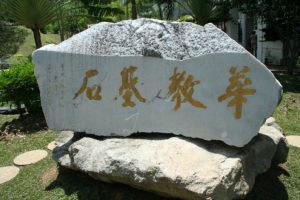Memo #174
By Ming-Chee Ang – angmingchee [at] gmail.com
The Chinese education movement in Malaysia fought for the survival of Chinese vernacular schools within the Malay-dominated education system since 1951. Today it is one of the most influential political entities among Chinese-speaking Malaysians. It is playing a critical role in influencing votes to support a movement-friendly political alliance in the next general election.

Foundation stone of the Chinese education movement at the movement headquarters in Kajang district, state of Selangor, Malaysia.
The movement represents a significant voting bloc, with supporters at the school, local, state, and national levels, linked through interpersonal bonds and inter-school networks. Political parties need the support of all ethnic groups to secure victory in elections, and Chinese votes comprise 20 per cent to 30 per cent of the total electorates in most constituencies.
Ahead of the upcoming 13th general election, competition between the National Front government and the People’s Alliance coalition provided an opportunity for the movement to pursue its goals and protest issues such as the shortage of Chinese school teachers. The National Front government responded and included movement representatives in a special committee in April 2012. The committee made procedural changes, such as removing teachers without Chinese language qualifications from senior positions within Chinese schools, and increasing the number of special training courses for Chinese school teachers.
The limited power of the special committee did not satisfy all and the movement’s leading organization, the United Chinese School Committees Association, withdrew. This significant blow to the negotiation process received mixed responses from Chinese communities nationwide. Albeit risky to adopt such open and high profile confrontation, this strategic approach effectively pressured the government.
The Chinese education movement endured within Malaysia’s semi-democratic system for the past six decades by successfully manoeuvring a fiercely contended electoral process. Victory in a general election provides significant symbolic legitimacy, even in semi-democratic Malaysia, allowing the movement to negotiate and demand compromises.
So far, the National Front government has responded to the movement’s demands and approved the first independent Chinese secondary school in Pahang. It also allocated special funding to Chinese schools nationwide. These compromises are the best indicators of the government’s level of frustration and desperation to win the general election.
About the Author:
Dr. Ming-Chee Ang is a political scientist and a senior analyst at the Penang Institute, Malaysia.
Links:
- “Social Mobilization of the Underdogs: The Damansara Save Our School Movement in Malaysia,” Pacific Affairs, June 2012 (by Ming-Chee Ang)
- Social Resistance in a semi-democracy, Penang Monthly, May, 2012 (by Ming-Chee Ang).
- Dong Jiao Zong – the destined dissident, Malaysia Kini, Jul 2002.
Related Memos:
- Our other Memos on Malaysia.